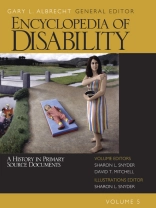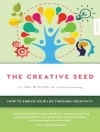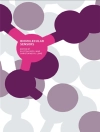To read some sample entries, or to view the Readers Guide click on ‘Additional Materials’ in the left column under ‘About This Book’. The wide range of coverage distinguishes this particular set, which was designed ‘to bring current knowledge and experience with disability across a wide variety of places, conditions, and cultures to both the general reader and the specialist.’ Editor Albrecht (University of Illinois at Chicago) and over 500 authors from around the world contributed the more than 800 entries. . . drawing in readers from a wide range of studies and interests and helping them to see disability in an entirely new way. Highly recommended for academic and large public libraries.’ — BOOKLIST (star review)
Obesity. Heart disease. Vision problems. Asthma. AIDS. Depression. Those maimed by land mines, machetes, bullets, bombs and beatings. These are just a few examples of how disability is becoming an increasingly common experience in our daily lives. Regardless of who we are or where we live, disability is with us.
SAGE Reference is proud to announce the five-volume Encyclopedia of Disability. This Encyclopedia represents the first attempt to bring an authoritative reference resource to the many faces of disability. It provides a fascinating entry into the world of disability where minds are expanded, prejudices shattered, and spirits raised. The Encyclopedia answers the question: What is disability and why is it important in my life? An international editorial board of seventy-four editors from the Americas, Europe, Australia, India, Japan, and China, all experts in their own sub-fields of disability, developed these volumes. The result is a multidisciplinary, cross-cultural, and historically grounded resource tool that guides the reader across fields, theories, debates, and practices.
Key Features
- Embraces five volumes that improve the reader′s understanding and appreciation of the world of disability: Volumes 1 – 4 cover disability A, including a Reader′s Guide, comprehensive bibliography, and index, and Volume 5 contains a wealth of primary source documents in the field of disability
- Includes contributions from more than 500 world-renowned scholars who have written over 1, 000 entries—in a clear, accessible style—with the desire to bring all students, researchers, and interested readers closer to the daily experience of disability
- Provides print and Web site references to government documents and data that are rich resources to investigate how disability is measured and treated on an international level
- Includes a chronology to place the concept of disability in a historical context
The Encyclopedia of Disability is a must-have reference for all academic libraries, large public libraries, and any social science, medical, legal, or governmental reference collections. Non-governmental organizations, charitable foundations, and law firms will also want to add this set to their collection.
Senior Editors
Jerome Bickenbach, Queen′s University
Scott Brown
Dudley Childress, Northwestern University Medical School
Joseph Flaherty, Univeristy of Illinois at Chicago
Allen Heinemann, Northwestern University
Tamar Heller, Univeristy of Illinois at Chicago
Christopher Keys, Univeristy of Illinois at Chicago
David Mitchell, Univeristy of Illinois at Chicago
Trevor Parmenter, University of Sydney, Australia
Mairian Scott-Hill, Marsh Hills Cottage
Tom Shakespeare, University of Newcastle
Sharon Snyder, Univeristy of Illinois at Chicago
Tentang Penulis
Gary L. Albrecht is a Fellow of the Royal Belgian Academy of Arts and Sciences, Extraordinary Guest Professor of Social Sciences, University of Leuven, Belgium and Professor Emeritus of Public Health and of Disability and Human Development at the University of Illinois at Chicago. After receiving his Ph.D. from Emory University, he has served on the faculties of Emory University in Sociology and Psychiatry, Northwestern University in Sociology, Rehabilitation Medicine and the Kellogg School of Management and the University of Illinois at Chicago (UIC) in the School of Public Health and in the Department of Disability and Human Development. Since retiring from the UIC in 2005, he divides his time between Europe and the United States. He works in Boulder, Colorado and Brussels, Belgium. He was recently a Scholar in Residence at the Maison des Sciences de l’Homme (MSH) in Paris, a visiting Fellow at Nuffield College, the University of Oxford and a Fellow in Residence at the Royal Flemish Academy of Science and Arts, Brussels












